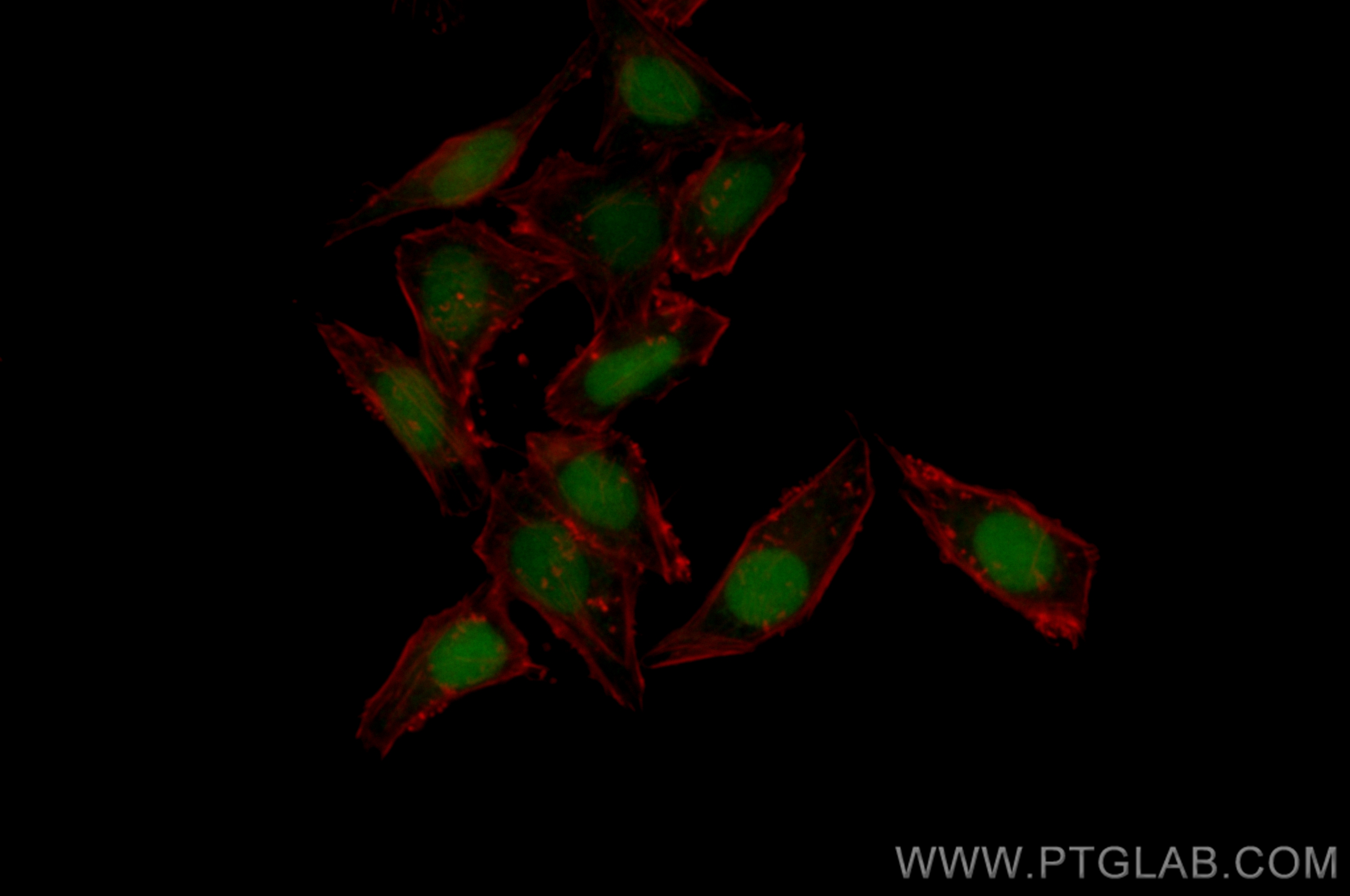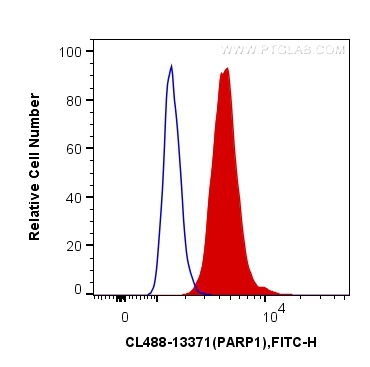验证数据展示
经过测试的应用
| Positive IF/ICC detected in | HepG2 cells |
| Positive FC (Intra) detected in | K-562 cells |
推荐稀释比
| 应用 | 推荐稀释比 |
|---|---|
| Immunofluorescence (IF)/ICC | IF/ICC : 1:50-1:500 |
| Flow Cytometry (FC) (INTRA) | FC (INTRA) : 0.20 ug per 10^6 cells in a 100 µl suspension |
| It is recommended that this reagent should be titrated in each testing system to obtain optimal results. | |
| Sample-dependent, Check data in validation data gallery. | |
产品信息
CL488-13371 targets PARP1 in IF/ICC, FC (Intra) applications and shows reactivity with human, mouse, rat samples.
| 经测试应用 | IF/ICC, FC (Intra) Application Description |
| 经测试反应性 | human, mouse, rat |
| 免疫原 |
CatNo: Ag4193 Product name: Recombinant human PARP1 protein Source: e coli.-derived, PGEX-4T Tag: GST Domain: 667-1014 aa of BC037545 Sequence: KPVQDLIKMIFDVESMKKAMVEYEIDLQKMPLGKLSKRQIQAAYSILSEVQQAVSQGSSDSQILDLSNRFYTLIPHDFGMKKPPLLNNADSVQAKAEMLDNLLDIEVAYSLLRGGSDDSSKDPIDVNYEKLKTDIKVVDRDSEEAEIIRKYVKNTHATTHNAYDLEVIDIFKIEREGECQRYKPFKQLHNRRLLWHGSRTTNFAGILSQGLRIAPPEAPVTGYMFGKGIYFADMVSKSANYCHTSQGDPIGLILLGEVALGNMYELKHASHISKLPKGKHSVKGLGKTTPDPSANISLDGVDVPLGTGISSGVNDTSLLYNEYIVYDIAQVNLKYLLKLKFNFKTSLW 种属同源性预测 |
| 宿主/亚型 | Rabbit / IgG |
| 抗体类别 | Polyclonal |
| 产品类型 | Antibody |
| 全称 | poly (ADP-ribose) polymerase 1 |
| 别名 | DNA ADP-ribosyltransferase PARP1, ARTD1, ADPRT1, ADPRT 1, ADPRT |
| 计算分子量 | 1014 aa, 113 kDa |
| 观测分子量 | 113-116 kDa, 89 kDa |
| GenBank蛋白编号 | BC037545 |
| 基因名称 | PARP1 |
| Gene ID (NCBI) | 142 |
| RRID | AB_2919070 |
| 偶联类型 | CoraLite® Plus 488 Fluorescent Dye |
| 最大激发/发射波长 | 493 nm / 522 nm |
| 形式 | Liquid |
| 纯化方式 | Antigen affinity purification |
| UNIPROT ID | P09874 |
| 储存缓冲液 | PBS with 50% glycerol, 0.05% Proclin300, 0.5% BSA, pH 7.3. |
| 储存条件 | Store at -20°C. Avoid exposure to light. Stable for one year after shipment. Aliquoting is unnecessary for -20oC storage. |
背景介绍
PARP1 (poly(ADP-ribose) polymerase 1) is a nuclear enzyme catalyzing the poly(ADP-ribosyl)ation of many key proteins in vivo. The normal function of PARP1 is the routine repair of DNA damage. Activated by DNA strand breaks, the PARP1 is cleaved into an 85 to 89-kDa COOH-terminal fragment and a 24-kDa NH2-terminal peptide by caspases during the apoptotic process. The appearance of PARP fragments is commonly considered as an important biomarker of apoptosis. In addition to caspases, other proteases like calpains, cathepsins, granzymes and matrix metalloproteinases (MMPs) have also been reported to cleave PARP1 and gave rise to fragments ranging from 42-89-kDa. This antibody was generated against the C-terminal region of human PARP1 and it recognizes the full-length as well as the cleavage of the PARP1.
实验方案
| Product Specific Protocols | |
|---|---|
| IF protocol for CL Plus 488 PARP1 antibody CL488-13371 | Download protocol |
| Standard Protocols | |
|---|---|
| Click here to view our Standard Protocols |




